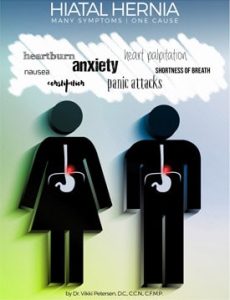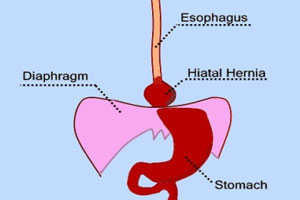What is Hiatal Hernia Syndrome? Is it Real? – Video
Hiatal Hernia Syndrome: Is it Real?
What you will learn about
Excerpt
Yes, there is! The hiatal hernia syndrome occurs in the upper abdomen, where the esophagus and stomach meet through an opening (hiatus) in the diaphragm.
Hiatal hernia syndrome is distinguished by the fact that the stomach may cause upward pressure against the diaphragm.
This condition can be seen in most people that are overweight due to increased intra-abdominal pressure. An increase in intra-abdominal pressure may also be due to chronic coughing, vomiting, obesity, pregnancy or a mass of the abdomen.
In this video, Dr Vikki talks more about the symptoms of the syndrome, and why Root Cause Medical Clinic is the facility of choice for hiatal hernia syndrome patients.
Transcript
I’ve had several people contact me lately. I just wrote a book called Hiatal Hernia Syndrome, and these people have nicely informed me there is no such thing as hiatal hernia syndrome.
The definition of syndrome is a group of symptoms that occur together. By that definition, I contend that hiatal hernia is absolutely a syndrome. But if you want to look it up elsewhere, you want to look it up in medical literature, I agree: it’s not there.
Much like my first book, The Gluten Effect: How “Innocent” Wheat Is Ruining Your Health, was all about gluten sensitivity, the gluten effect.
And guess what? When I wrote that book, there was no absolute concurrence around the world that there was such a thing as gluten sensitivity.
Now it’s frequently called non-celiac gluten sensitivity to distinguish between celiac disease and gluten sensitivity.
The fact is that things begin somewhere.
And I feel very, very strongly about the fact that our research here at Root Cause Medical Clinics has substantiated the existence of hiatal hernia syndrome.
What is hiatal hernia syndrome?
The problem is that the conventional model looks at hiatal hernia through the definition of what is a hernia. Something that’s coming through a part of the body that it shouldn’t.
The hiatus is a hole. So a hernia is something protruding through a hole that shouldn’t. In this case, it’s your stomach pushing up above your diaphragm and either adjacent to the esophagus, or just aligned with the esophagus, but in the incorrect position.
That poor stomach has gotten so compressed and so spasmed, that a bit of it is forcing up through the diaphragm and then opening that hole further, creating a lot of symptoms.
Now what’s so interesting about hiatal hernia syndrome is that you can have a tiny little hiatal hernia. You can have what’s called a sliding hiatal hernia, where it comes up and then it goes back down. It moves up and down.
You can have what we coined in our new book a “subclinical hiatal hernia“, meaning it’s actually not going above at all.
But what it is doing is pushing up, the stomach spasm is pushing up on your diagram enough to still create this syndrome, all these various symptoms.
Hiatal hernia syndrome: symptoms of

We have the classic symptoms of course, when your stomach is spasming and pushing upward: acid reflux, heartburn, GERD… They’re all quite similar.
You can have pressure in your chest. You can have shortness of breath. You can have heart palpitations, panic attacks, constipation or diarrhea, insomnia. And the list is longer than that.
These are, these are the big ones.
Can you have insomnia and not have a HD hernia? Of course! Can you have a panic attack and not have a hiatal hernia? Of course!
All those symptoms, you can have shortness of breath for a wide variety of reasons. However, when you have hiatal hernia syndrome, we’re finding that these symptoms are concurrent, they’re happening together.
Misdiagnosis or no diagnosis

“Oh, you have heart palpitations. Well, of course, let’s check out your heart. Oh, your heart’s fine“.
“You’re short of breath. Well, let’s check out your lungs. Oh, your lungs are fine“.
“You’re having a panic attack. Well, clearly, you have excess anxiety, so here’s your anti-depressant or anti-anxiety medication“.
And by the way, [these meds] can have life-threatening side effects.
And I’m not saying this lightly, I’m saying this because I’m annoyed and you deserve to know what this myriad of symptoms that you can be suffering with is.
Not to mention bloating. You wake up in the middle of the night, panicky, you can’t bend over, you have to lie back to stretch things so that you can breathe.
Maybe you used to exercise… Now you can hardly walk up the stairs without being short of breath. Yet your heart is fine. And your lungs are fine.
And that’s great that your heart is fine and your lungs are fine. But does that make what you’re saying and what you’re feeling “[something just] in your head”? Because that’s what they’ll try to tell you.
And it’s not, it’s absolutely not.
Hiatal hernia syndrome
So it is a syndrome because all of these symptoms can occur at the same time, and they have the same root cause. So what is that root cause?
That stomach is spasming. It’s pushing up on your diaphragm and it’s creating a myriad of symptoms.
It can affect the nervous system. You can have what’s called the vagus nerve, be irritated. The nerve that goes to your diaphragm comes from your neck. You could have neck pain, jaw pain.
People say: “Wow, I have pressure in my chest. I actually have pain down my left arm“.
Well, the nerves that go to your diaphragm and to your stomach actually also come from your lower neck… And they go down your arm.
So all of this [what you are complaining about] makes sense, but you go to your doctor and they don’t know what to do with you as soon as they confirm your heart’s fine and your lungs are fine.
And then of course, if they do an endoscopy and they say: “Yeah, you have acid reflux“. Then what? “Here’s your PPI“… “Here’s your acid reducer“…
They don’t tell you, you shouldn’t be on it for more than two weeks without causing I effects to digestion. They don’t mention that a lot of patients have been constipated their entire lives. And they’re told that’s normal. None of this is normal.
Bottom line: it’s real, and it can be treated

And if you like this information, share it with others. I cannot tell you how many people are suffering with hiatal hernia syndrome and have absolutely no idea.
Or they’ve just gone into defeat, and apathy about the whole thing, because they’ve been to the doctor and the doctor’s like, “listen, you’re fine. You’re gonna have to live with this”.
No you don’t, you absolutely don’t.
Reach out. Your first step is a first consultation.
Why Root Cause Medical Clinic?
At Root Cause Medical Clinic, we uncover the underlying root cause that is creating your body’s ill health or malfunction, ending the discomfort and inconvenience of poor health.
Our main goal is to identify the stressors overwhelming your body. They may be lifestyle or diet related, or they may emanate from a malfunction of an organ or system, such as the nervous system.
The facts are, these stressors are inhibiting your body’s ability to heal itself. If you have hiatal hernia syndrome, there is a root cause for it. Let’s stop ignoring it, and let’s find it.
Our team of clinicians share the same philosophy on health. They combine their experience in functional medicine, nutrition and dietetics, physical therapy and chiropractic to help you heal faster.
Root Cause Medical Clinic is located in Clearwater, FL, at the corner of Ft Harrison Ave. and Magnolia.
We also offer telehealth medicine services if coming to our clinic is not convenient. If you live in another state, please call us to see if we can serve you.
Resources
Hiatal hernia syndrome often misdiagnosed
Additional pathology information



